Abstract
Prenatal screening for hepatitis B surface antigen (HBsAg) restricted to women with defined risk factors for chronic hepatitis B virus (HBV) infection fails to identify many carriers. A centralized program of routine HBsAg screening for all pregnant women in Alberta was introduced in 1985. We collected and analysed data for the first 2 years of the program in Edmonton to determine the frequency of risk factors for HBsAg positivity, the proportion of multiparous HBsAg-positive women not identified in previous pregnancies, the efficiency and cost-effectiveness of providing immunoprophylaxis to infants at risk of HBV infection and the degree of success in inducing adequate protection. A total of 149 women (158 pregnancies) were found to be HBsAg positive. Risk factors were readily ascertainable for 85% of the women; the remaining 15% would not have been identified through risk-selective screening. The most common risk factors were Oriental ethnic origin, history of hepatitis, jaundice or multiple transfusions of blood or blood products, and occupational exposure to blood. Although 86% of the multiparous HBsAg-positive women had risk factors, only 7% had been identified in previous pregnancies. The Alberta program appears to be cost-effective. We conclude that only routine prenatal screening will identify all infants at risk of perinatal HBV infection and that a comprehensive public health program involving central laboratories, private physicians and public health staff can be highly effective and efficient in protecting infants against hepatitis B.
Full text
PDF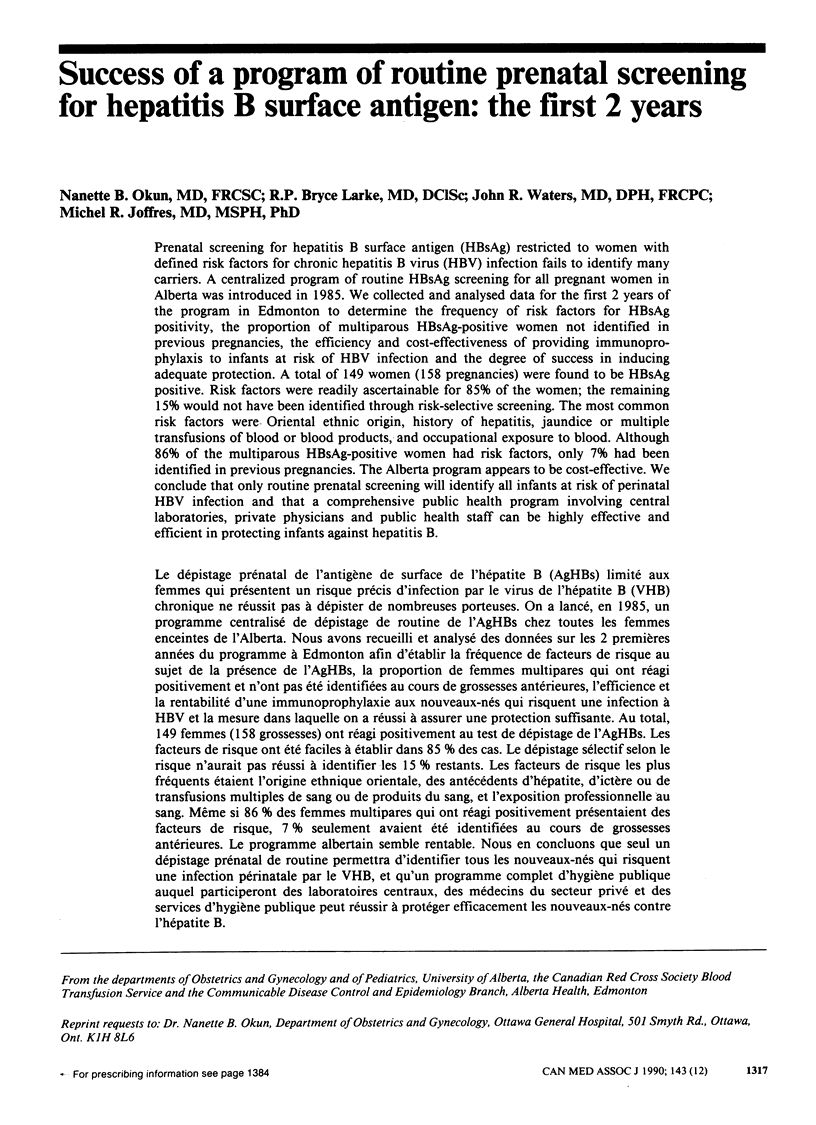
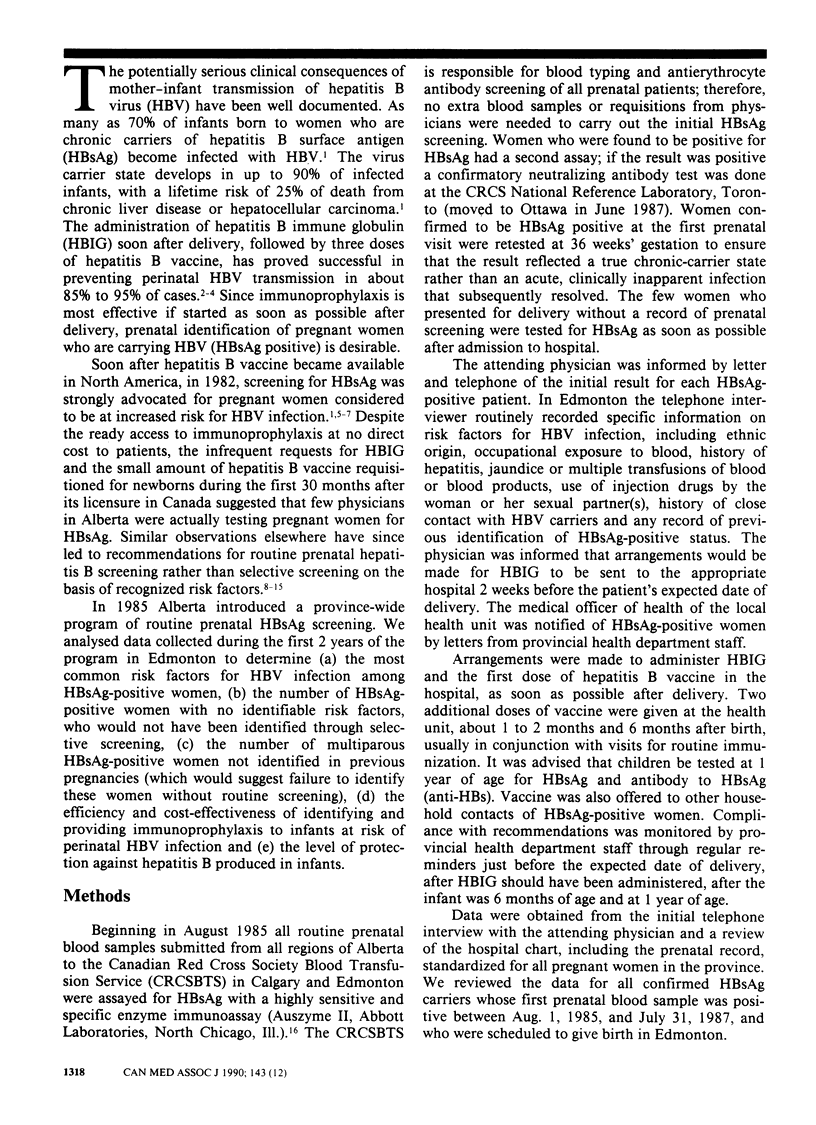
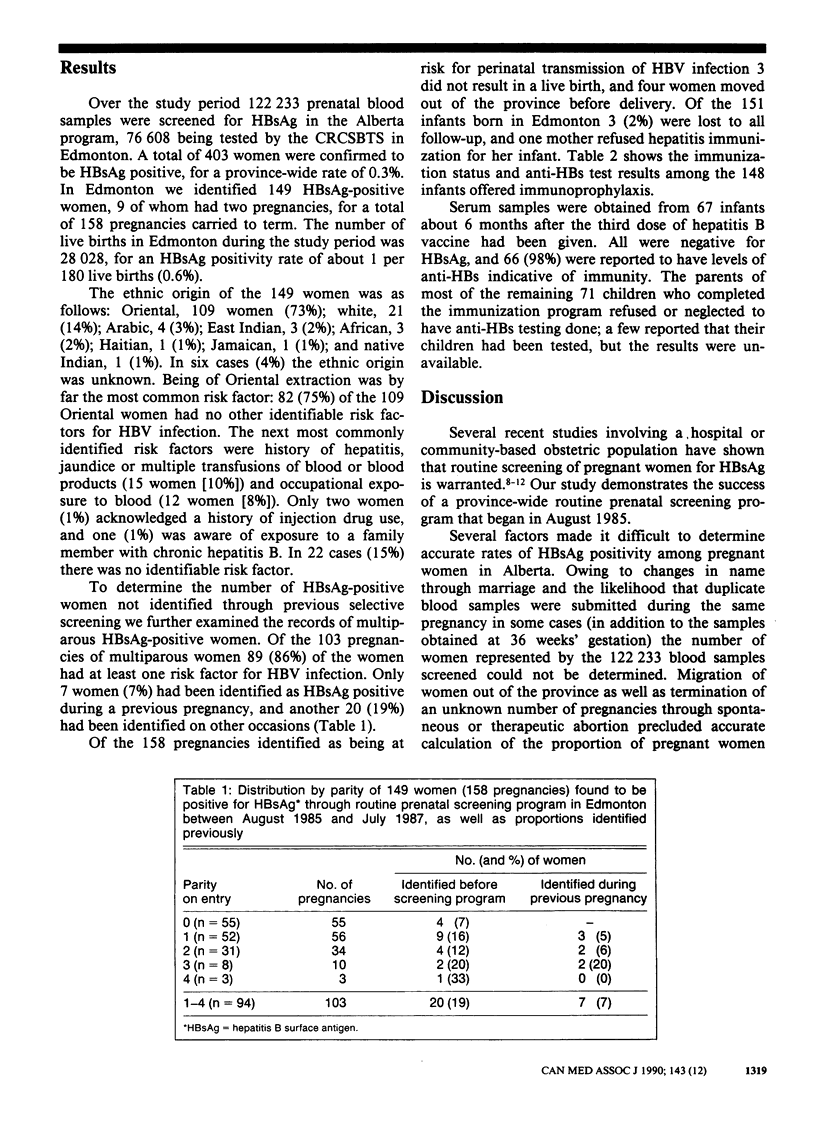
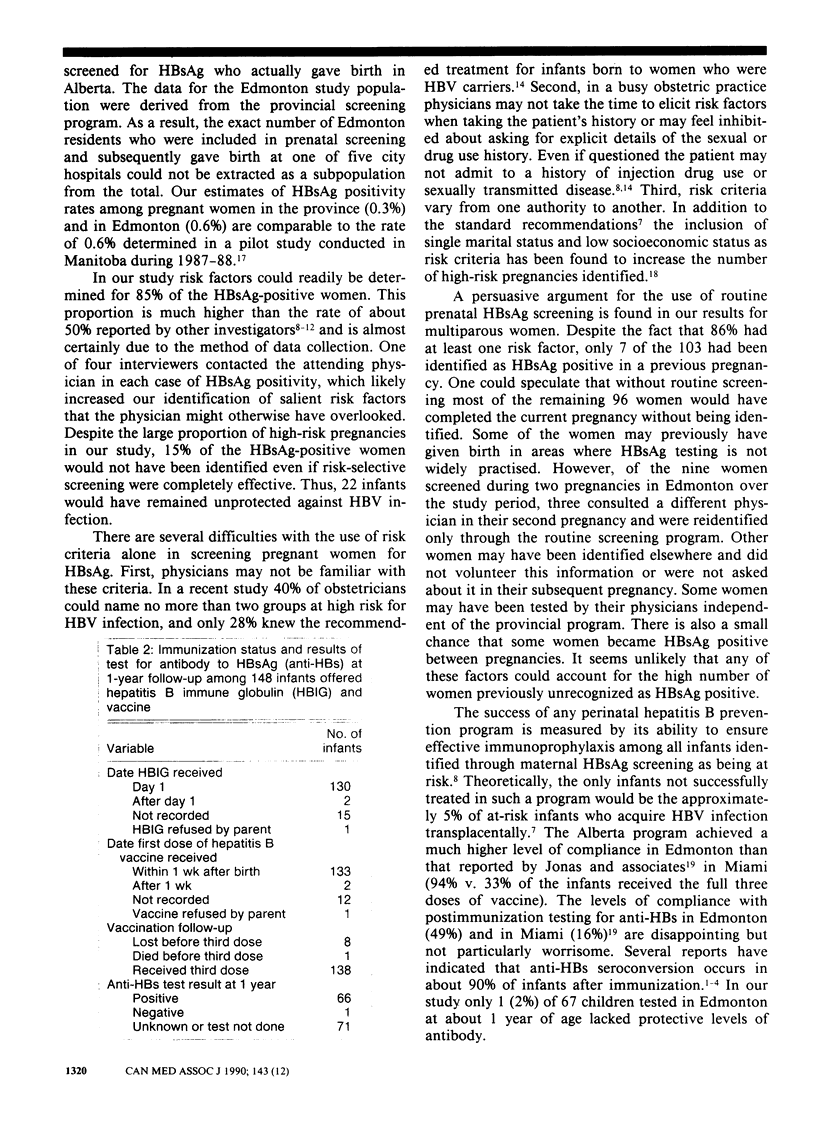
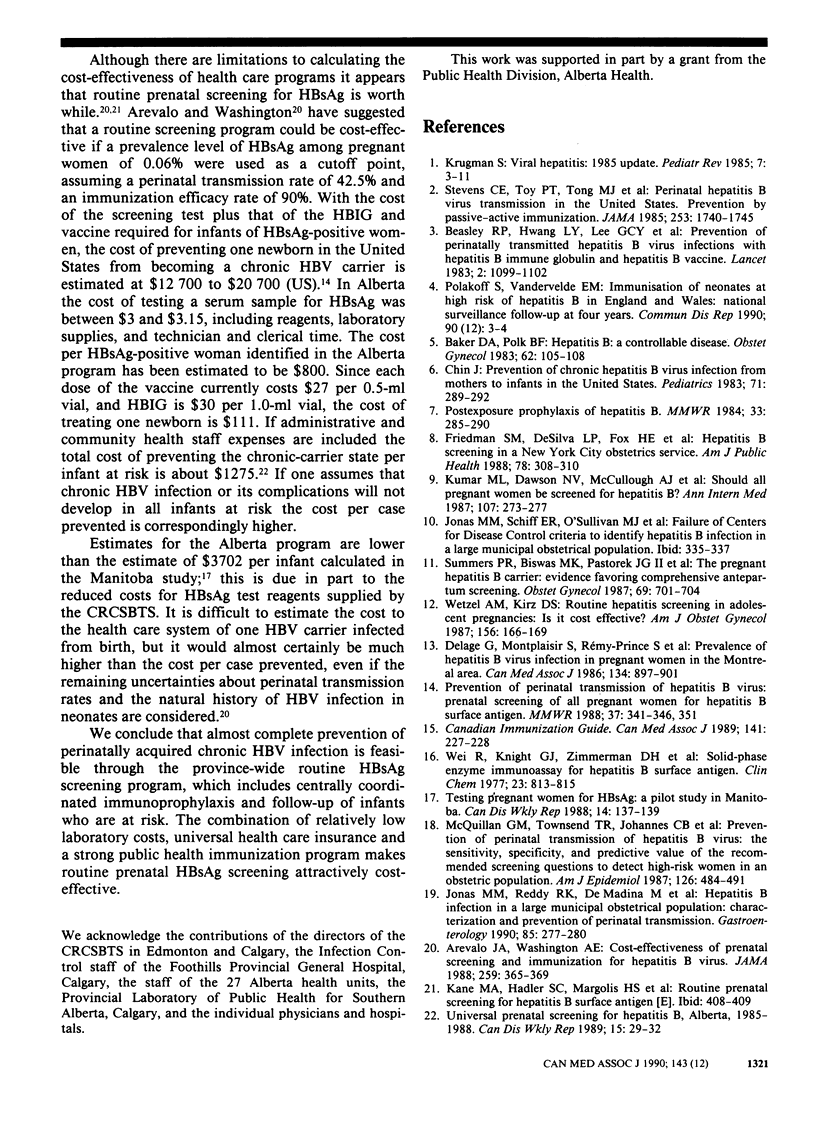
Selected References
These references are in PubMed. This may not be the complete list of references from this article.
- Arevalo J. A., Washington A. E. Cost-effectiveness of prenatal screening and immunization for hepatitis B virus. JAMA. 1988 Jan 15;259(3):365–369. [PubMed] [Google Scholar]
- Baker D. A., Polk B. F. Hepatitis B: a controllable disease. Obstet Gynecol. 1983 Jul;62(1):105–108. [PubMed] [Google Scholar]
- Beasley R. P., Hwang L. Y., Lee G. C., Lan C. C., Roan C. H., Huang F. Y., Chen C. L. Prevention of perinatally transmitted hepatitis B virus infections with hepatitis B immune globulin and hepatitis B vaccine. Lancet. 1983 Nov 12;2(8359):1099–1102. doi: 10.1016/s0140-6736(83)90624-4. [DOI] [PubMed] [Google Scholar]
- Chin J. Prevention of chronic hepatitis B virus infection from mothers to infants in the United States. Pediatrics. 1983 Feb;71(2):289–292. [PubMed] [Google Scholar]
- Delage G., Montplaisir S., Rémy-Prince S., Pierri E. Prevalence of hepatitis B virus infection in pregnant women in the Montreal area. CMAJ. 1986 Apr 15;134(8):897–901. [PMC free article] [PubMed] [Google Scholar]
- Friedman S. M., DeSilva L. P., Fox H. E., Bernard G. Hepatitis B screening in a New York City obstetrics service. Am J Public Health. 1988 Mar;78(3):308–310. doi: 10.2105/ajph.78.3.308. [DOI] [PMC free article] [PubMed] [Google Scholar]
- Jonas M. M., Reddy R. K., DeMedina M., Schiff E. R. Hepatitis B infection in a large municipal obstetrical population: characterization and prevention of perinatal transmission. Am J Gastroenterol. 1990 Mar;85(3):277–280. [PubMed] [Google Scholar]
- Kumar M. L., Dawson N. V., McCullough A. J., Radivoyevitch M., King K. C., Hertz R., Kiefer H., Hampson M., Cassidy R., Tavill A. S. Should all pregnant women be screened for hepatitis B? Ann Intern Med. 1987 Sep;107(3):273–277. doi: 10.7326/0003-4819-107-2-273. [DOI] [PubMed] [Google Scholar]
- McQuillan G. M., Townsend T. R., Johannes C. B., Dillard T., Molteni R. A., Ness P. M., Niebyl J. R. Prevention of perinatal transmission of hepatitis B virus: the sensitivity, specificity, and predictive value of the recommended screening questions to detect high-risk women in an obstetric population. Am J Epidemiol. 1987 Sep;126(3):484–491. doi: 10.1093/oxfordjournals.aje.a114680. [DOI] [PubMed] [Google Scholar]
- Stevens C. E., Toy P. T., Tong M. J., Taylor P. E., Vyas G. N., Nair P. V., Gudavalli M., Krugman S. Perinatal hepatitis B virus transmission in the United States. Prevention by passive-active immunization. JAMA. 1985 Mar 22;253(12):1740–1745. [PubMed] [Google Scholar]
- Summers P. R., Biswas M. K., Pastorek J. G., 2nd, Pernoll M. L., Smith L. G., Bean B. E. The pregnant hepatitis B carrier: evidence favoring comprehensive antepartum screening. Obstet Gynecol. 1987 May;69(5):701–704. [PubMed] [Google Scholar]
- Wei R., Knight G. J., Zimmerman D. H., Bond H. E. Solid-phase enzyme immunoassay for hepatitis B surface antigen. Clin Chem. 1977 May;23(5):813–815. [PubMed] [Google Scholar]
- Wetzel A. M., Kirz D. S. Routine hepatitis screening in adolescent pregnancies: is it cost effective? Am J Obstet Gynecol. 1987 Jan;156(1):166–169. doi: 10.1016/0002-9378(87)90230-4. [DOI] [PubMed] [Google Scholar]


